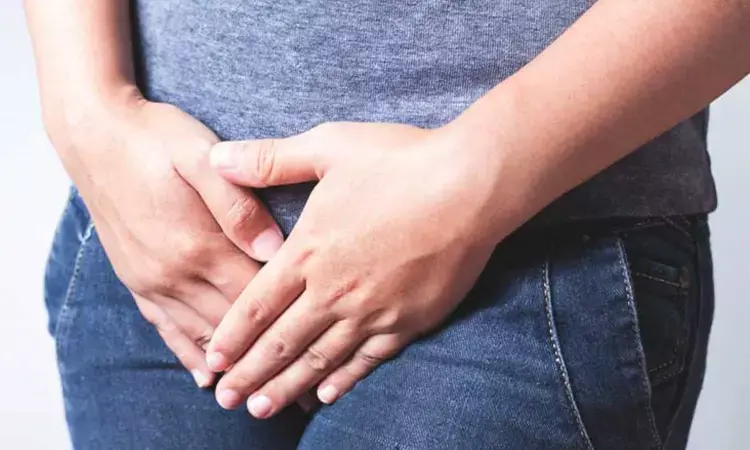- Home
- Medical news & Guidelines
- Anesthesiology
- Cardiology and CTVS
- Critical Care
- Dentistry
- Dermatology
- Diabetes and Endocrinology
- ENT
- Gastroenterology
- Medicine
- Nephrology
- Neurology
- Obstretics-Gynaecology
- Oncology
- Ophthalmology
- Orthopaedics
- Pediatrics-Neonatology
- Psychiatry
- Pulmonology
- Radiology
- Surgery
- Urology
- Laboratory Medicine
- Diet
- Nursing
- Paramedical
- Physiotherapy
- Health news
- Fact Check
- Bone Health Fact Check
- Brain Health Fact Check
- Cancer Related Fact Check
- Child Care Fact Check
- Dental and oral health fact check
- Diabetes and metabolic health fact check
- Diet and Nutrition Fact Check
- Eye and ENT Care Fact Check
- Fitness fact check
- Gut health fact check
- Heart health fact check
- Kidney health fact check
- Medical education fact check
- Men's health fact check
- Respiratory fact check
- Skin and hair care fact check
- Vaccine and Immunization fact check
- Women's health fact check
- AYUSH
- State News
- Andaman and Nicobar Islands
- Andhra Pradesh
- Arunachal Pradesh
- Assam
- Bihar
- Chandigarh
- Chattisgarh
- Dadra and Nagar Haveli
- Daman and Diu
- Delhi
- Goa
- Gujarat
- Haryana
- Himachal Pradesh
- Jammu & Kashmir
- Jharkhand
- Karnataka
- Kerala
- Ladakh
- Lakshadweep
- Madhya Pradesh
- Maharashtra
- Manipur
- Meghalaya
- Mizoram
- Nagaland
- Odisha
- Puducherry
- Punjab
- Rajasthan
- Sikkim
- Tamil Nadu
- Telangana
- Tripura
- Uttar Pradesh
- Uttrakhand
- West Bengal
- Medical Education
- Industry
Hydroxychloroquine treatment effective against anogenital lichen sclerosus: Study

A new study published in the recent issue of the International Journal of Dermatology unveiled the positive potential of hydroxychloroquine in treating anogenital lichen sclerosus because of its high response rates and low frequency of side effects. Few studies in the past have examined the effectiveness of hydroxychloroquine in the management of anogenital or extragenital lichen sclerosus. Ignoring this disease might result in more severe scarring and the development of malignant transformation. In order to examine the clinicopathological characteristics, treatment response, outcomes of patients diagnosed with extragenital or anogenital lichen sclerosus, and treatment with hydroxychloroquine therapy, the team led by Christeebella Akpala conducted this comprehensive study.
Close to 70 patients with lichen sclerosus who received hydroxychloroquine therapy at the host institution between the period of 2018 and 2023 were included in a retrospective analysis. A total of 3 male patients and 67 female patients made up the entire cohort. Of the 23 individuals identified with extragenital lichen sclerosus, 16 underwent concurrent morphea overlap. The most common clinical manifestation was itching which was observed in 67% of the study group. A significant fraction of patients required hydroxychloroquine medication due to a connective tissue disease, this summed up to 36%. Of the 30 patients treated just for lichen sclerosus, 9 patients had no reaction and 21 patients showed a response.
Anogenital response rate to hydroxychloroquine was 84.6% overall when compared to 50% in extragenital lichen sclerosus, according to a more comprehensive study. 4 months was the median delay from the first reaction. 10 individuals (14.3%) experienced adverse effects, the most of which were moderate. Due to its retrospective design and dependence on data from a single institution, this study had a small sample size, making it one of the limitations. Overall, hydroxychloroquine shows potential as a treatment for anogenital lichen sclerosus due to its high response rates and minimal prevalence of side effects. However, further research and dedicated prospective trials, especially with large-scale are required to determine its definite efficacy.
Reference:
Akpala, C. O., Tekin, B., Torgerson, R. R., Wetter, D. A., & Nguyen, G. H. (2024). Treatment of lichen sclerosus with hydroxychloroquine: a Mayo Clinic experience. In International Journal of Dermatology. Wiley. https://doi.org/10.1111/ijd.17394
Neuroscience Masters graduate
Jacinthlyn Sylvia, a Neuroscience Master's graduate from Chennai has worked extensively in deciphering the neurobiology of cognition and motor control in aging. She also has spread-out exposure to Neurosurgery from her Bachelor’s. She is currently involved in active Neuro-Oncology research. She is an upcoming neuroscientist with a fiery passion for writing. Her news cover at Medical Dialogues feature recent discoveries and updates from the healthcare and biomedical research fields. She can be reached at editorial@medicaldialogues.in
Dr Kamal Kant Kohli-MBBS, DTCD- a chest specialist with more than 30 years of practice and a flair for writing clinical articles, Dr Kamal Kant Kohli joined Medical Dialogues as a Chief Editor of Medical News. Besides writing articles, as an editor, he proofreads and verifies all the medical content published on Medical Dialogues including those coming from journals, studies,medical conferences,guidelines etc. Email: drkohli@medicaldialogues.in. Contact no. 011-43720751


